#Lok Sabha Election Politics
Text
There was a one to one contest on this seat of Bihar, the fight became interesting due to the entry of AIMIM, the reputation of Lalu-Nitish at stake.
highlights
Lalu-Nitish’s reputation at stake on Gopalganj Lok Sabha seat.Lok Sabha elections are to be held in Gopalganj in the sixth phase on 25th May.AIMIM is spoiling the formation of JDU and VIP.
Gopalganj. Lok Sabha elections in Gopalganj will be held in the sixth phase on 25th May. In RJD supremo Lalu Prasad’s home district Gopalganj, JDU MP Dr Alok Kumar Suman from NDA and VIP candidate…
View On WordPress
#2024 Lok Sabha Elections#2024 Loksabha Election#AIMIM#Bihar#Bihar latest news#Bihar NDA#bihar news#Bihar news in hindi#bihar politics#Bihar Samachar#Bihar today&039;s news#CM Nitish Kumar#contest#due#entry#fight#INDIA Alliance#interesting#Lalu Prasad Yadav#lalu yadav news#LaluNitish#lok sabha chunav 2024#Lok Sabha Election Politics#Loksabha Elections#mahagathbandhan#reputation#seat#stake
0 notes
Text
Not people saying "disappointed in UP for making the people who brought Lord Ram home lose the elections". AREN'T YOU GUYS THE SAME PEOPLE WHO WERE CURSING ME ABOUT SAYING SOMETHING ABOUT THE RAM MANDIR BY SAYING THAT IT'S A MATTER OF FAITH AND NOT POLITICS? At least stick to your own arguments, lmao.
-Mod S
#desiblr#hindublr#indian politics#indpol#india#indian elections#lok sabha elections#lok sabha 2024#mod: s
177 notes
·
View notes
Text
i was going through my asks and all that and I realised that although I know a little about politics I'm still not all well aware about everything to judge or speak with certainty about everything,so I would be pretty grateful if you could suggest me books I could read to get more information about everything related to Indian politics especially.
You can simply message me or send it to my asks. Thank you a lot already!
#desi tag#desiblr#desi tumblr#being desi#indian#indian politics#indian elections#lok sabha elections#indian tumblr#india
3 notes
·
View notes
Text
I was anxious in 2014, had panic attacks in 2019, thankgod i am in transit today, otherwise I'd be such a mess, election results are not exciting when it is a do or die situation
6 notes
·
View notes
Text
Understanding the Lok Sabha Elections: A Comprehensive Guide for Political Science Students
The Lok Sabha elections, a pivotal event in India’s democratic framework, offer a rich field of study for political science students. Since India’s independence in 1952, these elections have been a cornerstone of the country’s democratic process, shaping its political landscape and governance.
Key Stakeholders in the Lok Sabha Elections
The Lok Sabha elections involve a diverse range of stakeholders, each playing a crucial role in the electoral process. These include the Election Commission of India, which oversees the conduct of elections, and the political parties and candidates who vie for the electorate’s votes.
The voters themselves, the media, civil society organizations, security forces, and observers/international agencies also play significant roles. Each stakeholder has a unique part in shaping the election’s outcome and, by extension, the country’s political future.
The Lok Sabha Election Process
Understanding the Lok Sabha election process is fundamental to grasping the complexities of India’s democratic governance. The process involves several stages:
Electoral Constituencies: The country is divided into various electoral constituencies, each represented by a Member of Parliament.
Voter Registration: Eligible citizens are registered as voters.
Nomination of Candidates: Political parties or independent candidates file their nominations for the elections.
Campaigning: Candidates and parties campaign to win the electorate’s favor.
Voting: Registered voters cast their votes on Election Day.
Counting of Votes and Formation of Government: Votes are counted, and the party or alliance with the majority of seats forms the government.
Focus Areas for Political Science Students
Political science students studying the Lok Sabha elections should focus on several key areas to understand the complexities of democratic governance and political evolution. These include learning about electoral systems, political parties and alliances, election monitoring and reform, and voter behavior and participation.
By studying these areas, students can gain a comprehensive understanding of the Lok Sabha elections, equipping them with the knowledge to analyze and interpret the dynamics of India’s political landscape.
To know more, read this blog
#india#lok sabha elections#lok sabha 2024#lok sabha polls#election 2024#india elections#political science#election process
6 notes
·
View notes
Text
Narendra Modi: Everything About The PM Of India
Narendra Modi, the current Prime Minister of India, is a leader who has left an indelible mark on the nation's political, economic, and social landscape. Known for his dynamic leadership, visionary policies, and charismatic personality, Modi has transformed India in numerous ways. This comprehensive blog delves into everything about Narendra Modi, offering insights into his early life, political journey, significant achievements, and influence on India and the world.
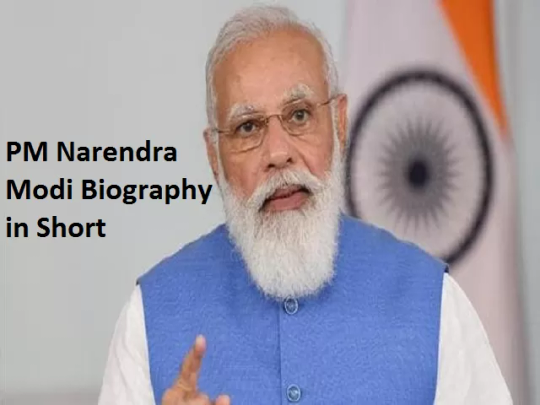
Early Life and Background
Narendra Damodardas Modi was born on September 17, 1950, in Vadnagar, a small town in northern Gujarat, India. Coming from a humble background, Modi's early life was marked by hardship and determination. He helped his father sell tea at the local railway station, an experience that shaped his understanding of grassroots issues and the common man's struggles.
Education and Early Interests
As per the UK Newspapers News Modi completed his schooling in Vadnagar and later pursued a degree in political science, earning an M.A. from Gujarat University in Ahmedabad. His early interest in serving the nation led him to join the Rashtriya Swayamsevak Sangh (RSS), a Hindu nationalist organization, in the early 1970s. Modi set up a unit of the RSS’s students’ wing, the Akhil Bharatiya Vidyarthi Parishad, in his area, where he honed his leadership skills and ideological beliefs.
Political Journey
Modi's political journey began with his active involvement in the RSS, which eventually led to his association with the Bharatiya Janata Party (BJP) in 1987. Within a year, he was made the general secretary of the Gujarat branch of the party. Modi played a pivotal role in strengthening the party’s presence in the state, contributing to the BJP's success in the 1995 state legislative assembly elections and the formation of the first-ever BJP-controlled government in India.
Chief Minister of Gujarat
In 2001, Narendra Modi was appointed the Chief Minister of Gujarat, following the poor response of the incumbent government to the Bhuj earthquake. He entered his first-ever electoral contest in a February 2002 by-election, winning a seat in the Gujarat state assembly.
Modi’s tenure as chief minister was marked by both achievements and controversies. His role during the 2002 communal riots in Gujarat drew international criticism, with allegations of condoning the violence or failing to act decisively to stop it. Despite these controversies, Modi’s political career in Gujarat was marked by repeated electoral successes in 2002, 2007, and 2012, establishing him as a formidable leader within the BJP.
Rise to National Leadership
Modi's success in Gujarat laid the foundation for his rise to national prominence. In June 2013, Modi was chosen as the leader of the BJP’s campaign for the 2014 elections to the Lok Sabha. His campaign focused on development, good governance, and anti-corruption, resonating with millions of Indians. In the 2014 elections, he led the BJP to a historic victory, securing a clear majority of seats in the Lok Sabha.
First Term as Prime Minister (2014-2019)
Modi was sworn in as Prime Minister on May 26, 2014. His first term was marked by several significant initiatives and reforms aimed at transforming India:
Goods and Services Tax (GST): Launched in 2017, GST is one of the most significant tax reforms in India's history, simplifying the indirect tax structure.
Demonetization: In 2016, Modi announced the demonetization of high-value currency notes to curb black money and counterfeit currency.
Swachh Bharat Abhiyan: Launched in 2014, this nationwide cleanliness campaign aimed to eliminate open defecation and improve solid waste management.
Digital India: An ambitious program to transform India into a digitally empowered society and knowledge economy.
Make in India: Aimed at making India a global manufacturing hub, this initiative encourages companies to manufacture their products in India.
Modi's foreign policy achievements included hosting Chinese President Xi Jinping and making a highly successful visit to New York City, where he met with U.S. President Barack Obama.
Second Term as Prime Minister (2019-2024)
The Modi-led BJP won a majority again in the 2019 general election. His second term saw continued efforts to promote Hindu culture and implement economic reforms:
Revocation of Jammu and Kashmir's Special Status: In October 2019, Modi's government revoked the special status of Jammu and Kashmir, bringing it under the direct control of the union government.
COVID-19 Pandemic Response: Modi took decisive action to combat the COVID-19 outbreak, implementing strict nationwide restrictions and promoting vaccine development and distribution.
Despite facing protests and criticism for some policies, such as agricultural reforms, Modi's leadership remained influential. The BJP faced setbacks in state elections in late 2018, but Modi's charisma and a security crisis in Jammu and Kashmir boosted his image ahead of the 2019 elections.
Third Term as Prime Minister (2024-Present)
In the 2024 Lok Sabha elections, the BJP won 240 seats, and the BJP-led National Democratic Alliance (NDA) secured 293 of the 543 seats, allowing Modi to become Prime Minister for a third consecutive term. Although the BJP did not secure a majority on its own, the NDA's coalition support ensured their continued governance.
Personal Life and Public Image
Narendra Modi is known for his disciplined lifestyle, early morning yoga sessions, and simple living. Despite his high-profile status, he remains deeply connected to his roots and continues to draw inspiration from his early life experiences.
Communication and Public Engagement
Modi's communication skills are unparalleled, often using social media and public addresses to connect with citizens. His monthly radio program, "Mann Ki Baat," has become a popular platform for sharing his thoughts and initiatives with the nation.
Conclusion
Narendra Modi's journey from a small-town boy to the Prime Minister of the world's largest democracy is a testament to his resilience, dedication, and visionary leadership. His impact on India's socio-economic fabric, governance, and international relations is profound and continues to shape the country's future.
Whether admired or criticized, Narendra Modi's influence on India and the global stage is undeniable. His story is not just about a political leader but also about the transformative power of determination and leadership.
Stay tuned to our blog for more updates and in-depth analyses of Narendra Modi's policies, initiatives, and their impact on India and the world.
#Narendra Modi#Prime Minister of India#BJP#Bharatiya Janata Party#Indian politics#Gujarat#Chief Minister#Lok Sabha#2014 elections#2019 elections#2024 elections#RSS#Rashtriya Swayamsevak Sangh#Gujarat Model#economic reforms#GST#Goods and Services Tax#demonetization#Swachh Bharat Abhiyan#Digital India#Make in India#foreign policy#Jammu and Kashmir#COVID-19 response#Narendra Modi achievements#Modi government#Indian economy#Modi's early life#political career#Hindu nationalism
0 notes
Text
India's Historic Election: A Mandate for Democracy and Inclusivity
The recent general election in India has sent a resounding message to the world: The Indian people have spoken, and their voice is one of unity, inclusivity, and a strong commitment to democratic principles. The outcome, though uncertain in terms of the next government’s composition, is a testament to the country’s resilience and its unwavering dedication to the values of democracy. This outcome…
View On WordPress
#bjp#Indian Democracy#Indian Elections#Lok Sabha Elections 2024#Narendra Modi#Secular India#Socio Political Issues
0 notes
Text
Anything to stop Narendra Modi from becoming Prime Minister; Asaduddin Owaisi
AIMIM chief Asaduddin Owaisi, the candidate for the Lok Sabha seat from Hyderabad, openly said that he is willing to support anyone other than Narendra Modi in the fight for prime ministerial candidate.
In a statement to ANI, Mr. Owaisi said "I cannot talk about ifs, buts, and possibilities. I had said during the elections that if there is a chance that someone else can become the PM instead of Modi, then we will support them."
Talking about the Lok Sabha elections in 2024, Owaisi said that getting this many votes in the election should not have happened for BJP this time.
The atmosphere that was there in the country, according to the BJP should not have got even this number of seats. If we had done the right work they would have just got 150 seats. We could have stopped the BJP from forming the government and even the public wanted this, but were unsuccessful. But, at least we cannot be blamed," said Mr Owaisi.
"One thing is clear there wasn't any Muslim vote bank in the country and there never will be," he added.
Owaisi also talked about the BJP’s performance in Uttar Pradesh and said, "They thought they were invisible in UP but no one is invincible. Will PM Modi run the government with the help of crutches?"
Mr. Owaisi recorded 6,61,981 votes and defeated BJP's Madhavi Latha.
Thanking the people, Owaisi in a press conference said, I would like to thank the people as they have given success to Majlis for the fifth time. I would like to thank the people of Hyderabad, especially the youth, women, and first-time voters who have given a historic success to the AIMIM party."
For more political news in Hindi, subscribe to our newsletter.
#werindia#leading india news source#top news stories#top news headlines#top news of the day#latest national news#indian politics#national news#political news#latest political news#politics#election#election results#lok sabha
1 note
·
View note
Text
Lok Sabha चुनाव में Jharkhand की राजनीति में अहम कोण बनकर उभरा 'JBKSS' नामक संगठन
Ranchi: दशकों से क्षेत्री��� राजनीति की प्रयोगशाला रहे झारखंड में इस लोकसभा चुनाव में एक अहम राजनीतिक परिघटना हुई है। यह है, जेबीकेएसएस यानी झारखंडी भाषा खतियानी संघर्ष समिति नामक संगठन का सियासी उभार।
झारखंड के डोमिसाइल, भाषा, नौकरी और परीक्षा जैसे सवालों पर चार सालों से आंदोलन करने वाले युवाओं के इस संगठन ने राज्य की आठ लोकसभा सीटों पर अपने उम्मीदवार उतारे। कम से कम तीन सीटों पर इसके उम्मीदवार…
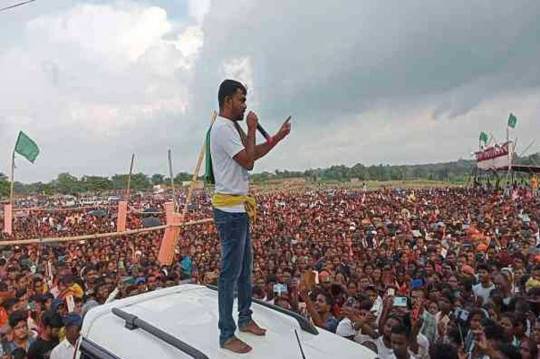
View On WordPress
#An important political phenomenon#JharkhandNews#regional politics#taken place in this Lok Sabha election
0 notes
Text
youtube
#Indian Elections#Politics in India#Indian Economy#Indian Society#Media Bias#Voter Education#Foreign Policy#Trade Deficit#Brain Drain#English Language in India#Indian Democracy#Over-taxation#Petrol Prices#Rupee Value#empire diaries#ratnasradar#lok sabha election#election#election 2024#joe biden#politics#history#Youtube
0 notes
Text
UP Lok Sabha Election Results 2024 Samajwadi candidate Ruchi Veera said Azam Khan is my political guru after winning from Moradabad ann
UP Lok Sabha Election Results 2024: The results of the 2024 Lok Sabha elections have come. Samajwadi Party candidate Ruchi Veera has won from Moradabad Lok Sabha seat. BJP candidate Kunwar Sarvesh Kumar has lost the election. Ruchi Veera has won by 105762 votes. In the election, SP candidate Ruchi Veera got 637363 votes, while BJP candidate Sarvesh Kumar got 531601 votes. and Bahujan Samaj Party…
View On WordPress
#ann#Azam#AZam Khan#Azam Khan Political Guru#candidate#Election#elections 2024#Guru#Khan#LOK#Lok Sabha Chunav Result 2024#lok sabha elections 2024#Lok Sabha Elections Result 2024#Moradabad#Moradabad news#political#Results#Ruchi#Ruchi Veera#Ruchi Vira#SABHA#samajwadi#samajwadi party#ST Hasan Lok Sabha Elections 2024 Result#UP#up news#Veera#winning
0 notes
Text
Potential Impacts on India if Narendra Modi Loses the 2024 Lok Sabha Election: Stock Markets, Economy, and Growth
If Narendra Modi loses in the Lok Sabha election 2024, it would represent a significant political shift for India, potentially impacting the stock markets, economy, and overall growth trajectory of the country. Here’s a detailed analysis of the potential impacts:
Stock Markets
Immediate Market Reaction:
Volatility and Uncertainty: The initial reaction of the stock markets is likely to be one…
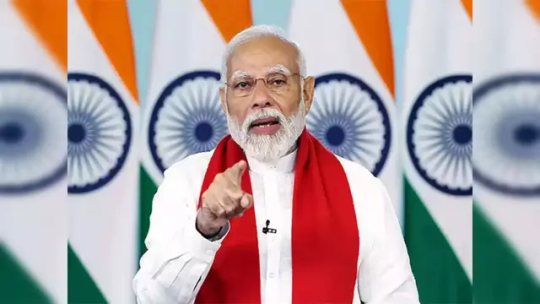
View On WordPress
#2024 Lok Sabha Election#Economic growth#Economic reforms#EconomicGrowth#EconomicPolicy#Foreign Investment#IndiaGrowth#Indian Economy#Indian Stock Markets#IndianEconomy#Investment#LokSabhaElection2024#Market Volatility#MarketVolatility#Narendra Modi#NarendraModi#Policy Changes#Political Impact#PoliticalImpact#StockMarkets
0 notes
Text
Anantnag-Rajouri Lok Sabha constituency records 53 per cent voter turnout
SRINAGAR — The Anantnag-Rajouri Lok Sabha constituency recorded a 53-per cent voter turnout on Saturday, as polling for the five Lok Sabha seats in Jammu and Kashmir came to an end, officials said.
Fifty-eight per cent of the 87.26-lakh electorate exercised their franchise in the first major election in the Union Territory following the abrogation of Article 370 of the Constitution by the Centre…
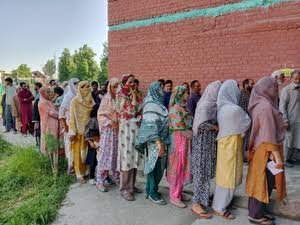
View On WordPress
#Anantnag-Rajouri Lok Sabha Seat#Chief Electoral Officer (CEO)#Election#Jammu#Jammu and Kashmir (J&K)#Kashmir#Lok Sabha Election#Politics#Voting
0 notes
Text
Today in Politics: Campaigning Heats Up for Phase 7
With the sixth phase of the Lok Sabha elections nearing its end, political leaders are gearing up for the final phase on June 1. Here’s a glimpse of the key campaign movements:
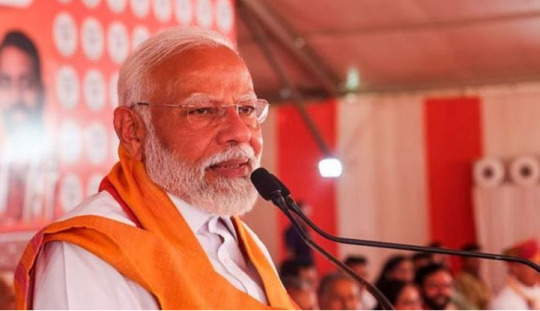
PM Modi’s Himachal and Punjab Campaign
Prime Minister Narendra Modi is set to kick off his campaign in Himachal Pradesh, followed by electioneering in Punjab. He will address public meetings in Shimla and Mandi in Himachal, and later hold rallies in Gurdaspur and Jalandhar in Punjab. The BJP has made strategic candidate changes in key constituencies for the upcoming polls.
Shah and Kharge in Jharkhand
Union Home Minister Amit Shah and Congress president Mallikarjun Kharge will campaign in Godda, Jharkhand. Shah will address public meetings in Arrah and Jharkhand, while Kharge will hold a press conference and public meeting in Deoghar.
Mayawati’s Rally in Punjab
BSP chief Mayawati will hold a rally in Nawanshahr, Punjab, targeting the significant Dalit population in the Anandpur Sahib Lok Sabha constituency. The BSP is contesting all 13 seats in Punjab, aiming to secure a substantial vote share.
As the political landscape heats up, stay tuned for more updates on the Lok Sabha elections.
0 notes
Text
"Political Buzz: PM Modi's Varanasi Roadshow and Phase 4 Turnout Predictions"
As the Lok Sabha elections progress, the political arena is abuzz with activity. In the midst of campaigning and voting, today marks significant developments, including Prime Minister Narendra Modi’s highly anticipated roadshow in Varanasi, his constituency.
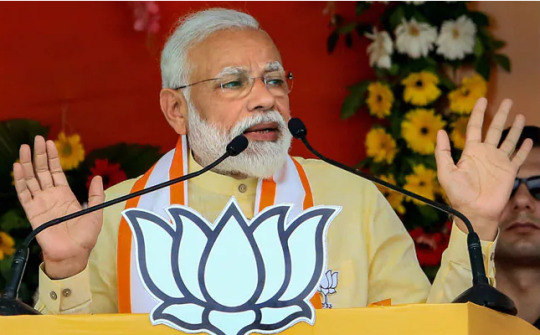
With four phases of voting completed, attention shifts to the turnout figures for the fourth phase, encompassing 96 constituencies across 10 states and Union Territories. The turnout trends have been closely scrutinized, particularly after slight decreases in participation observed in earlier phases.
Prime Minister Modi’s roadshow in Varanasi is expected to be a grand affair, reflecting the fervor and excitement surrounding his candidacy. Following the roadshow, Modi will file his nomination papers, a symbolic moment in the electoral process.
Earlier engagements for the Prime Minister include addressing an event in Hajipur, the former seat of late leader Ram Vilas Paswan, where Chirag Paswan, his son and Lok Janskhakti Party chief, is a candidate. Modi’s itinerary also includes public meetings in Muzaffarpur and Saran, where he will extend his support to Chirag Paswan’s campaign.
Meanwhile, Rahul Gandhi, a prominent figure in the Congress party, is scheduled to embark on a campaign trail in Rae Bareli, Uttar Pradesh. With the fifth phase of voting approaching on May 20, Gandhi’s efforts aim to bolster support for the Congress in the region.
As the political landscape continues to evolve, stay tuned for updates on the unfolding events and their implications on the electoral dynamics.
0 notes
Text
“We have to wait, just wait and see,” Sonia Gandhi reacts to exit polls
On Monday, Sonia Gandhi reacted to the exit poll results, saying that the Congress party is very hopeful that this Lok Sabha Election results will favor the Congress party, which is the complete opposite of what the pollsters have been predicting for all this while.
Talking to the press, Sonia Gandhi said, “We have to wait, just wait and see.” She said this while explaining her expectations from the election results to be announced on Tuesday, June 4.
The former congress party president said, "We are very hopeful that our results are opposite to what the exit polls are showing."
The majority of exit polls have declared that the Modi government will come to power with Prime Minister Narendra Modi taking the reign of the country for the third time in a row. The Bhartiya Janta Party-led NDA government is expected to come to power for the third time with great achievement.
Most exit polls have said that Narendra Modi's government will win with over 400 seats whereas others have claimed the win of 350+ seats. The majority mark is set at 272 seats that are required to form a government.
Most of the opposition parties have declined the claim saying that the polls are a fantasy work and not at all close to reality. On Sunday, Rahul Gandhi told the press that it shouldn’t be called exit polls but its name is “Modi media poll”. “This is Modi ji's poll, it is his fantasy poll,” the former Congress president said.
For more political news in Hindi, subscribe to our newsletter.
#werindia#leading india news source#top news stories#top news headlines#national news#top news of the day#latest national news#indian politics#latest politics news#political news#politicians#lok sabha election 2024#rahul gandhi#narendramodi#pm modi#election results 2024
1 note
·
View note